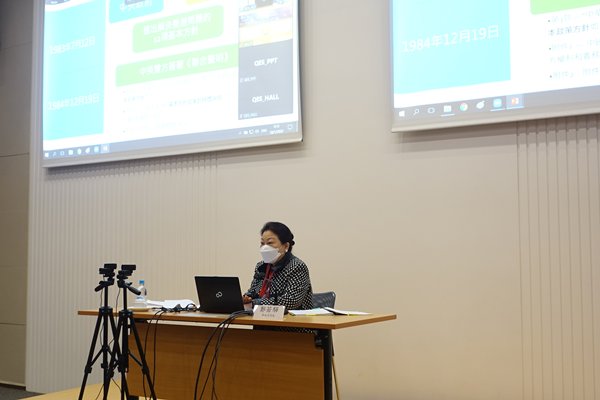SJ addresses govt school teachers

Secretary for Justice Teresa Cheng speaks on the relationship between the Constitution and the Basic Law at a forum attended by government school principals and teachers.
Secretary for Justice Teresa Cheng spoke to over 1,300 school principals and teachers on the relationship between the Constitution and the Basic Law at a symposium of the Association of Principals of Government Secondary Schools today.
She also spoke on the importance of safeguarding national security and the improved electoral system at the forum.
Ms Cheng started her talk by introducing the legal hierarchy to illustrate the Constitution as the fundamental law of the state with the highest legal effect.
She highlighted that the relevant provision on the establishment of special administrative regions was written into the Constitution in 1982 and the National People's Congress (NPC) made the decision on the establishment of the Hong Kong SAR and adopted the Basic Law in accordance with the Constitution on April 4, 1990.
The Constitution and the Basic Law together form the constitutional basis of the Hong Kong SAR to enable the implementation of "one country, two systems", she said, emphasising that the root of "one country" should be upheld so that the "two systems" can continue to flourish.
Ms Cheng then described that the National Security Law was enacted by the NPC, which exercised its power conferred by the Constitution, to prevent, suppress and impose punishment for any act endangering national security.
While taking time to explain the granting of bail and the designation of judges under the security law to dispel misconceptions in the community, she reiterated that Hong Kong has the constitutional responsibility to complete, as early as possible, the legislation for safeguarding national security as stipulated in the Basic Law.
Regarding the NPC's decision to improve Hong Kong’s electoral system, the Secretary for Justice said such a move had taken into account the city’s actual situation, has a solid legal basis and provides a robust systemic safeguard for "patriots administering Hong Kong".
The Legislative Council election that concluded smoothly last December fully demonstrated broad representation, political tolerance, balanced participation and fair competition, thereby promoting good governance in Hong Kong, she added.
Ms Cheng said a new era for democracy has been opened in Hong Kong only with the support of the central government since its return to the motherland. Articles 45 and 68 of the Basic Law clearly states that the ultimate aim of universal suffrage should be achieved in light of the city’s situation and in accordance with the principle of gradual and orderly progress.
She also quoted a judgment of the European Court of Human Rights and the United Nations General Assembly resolutions that said there is no single model of democracy and it is for each state to mould its own democratic vision according to its circumstances.
Ms Cheng noted that through the symposium, she hopes the education sector would gain a better understanding of the Constitution, the Basic Law, the National Security Law and the improved electoral system so that it could impart correct knowledge to students, thereby nurturing them into a law-abiding generation with a sense of national identity.